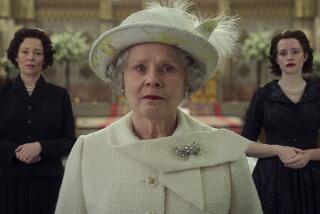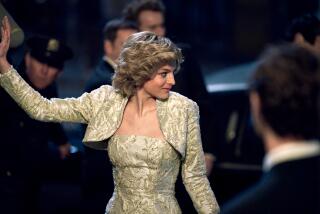Yet Another Jewel in the BBC Crown : Television: ‘To Play the King’ is the exquisitely sinister four-part sequel to 1991’s superb political thriller ‘House of Cards.’
- Share via
God save the king . . . from Francis Urquhart.
When we last looked in on F.U. (as his closest associates call him), he was heaving Mattie Storin from the roof of the House of Commons to stop the young reporter (who was his lover) from blabbing about his homicidal ways.
Her jolting demise ended “House of Cards,” the 1991 political thriller that PBS has just rerun on “Masterpiece Theatre” in advance of Sunday’s start of the exquisitely sinister four-part sequel, “To Play the King.”
Continuing to nose through the sewers of stench beneath the glittery salons of power, the new BBC series (airing Sunday at 9 p.m. on KCET-TV Channel 28 and KPBS-TV Channel 15, 8 p.m. on KVCR-TV Channel 24) finds F.U. (Ian Richardson) as scheming and lethal as ever, but even more dangerous now that he has realized his dream of becoming England’s prime minister. Bits of conscience now and then squirm their way through F.U.’s thick layers of greed and ambition, however, and he is tormented by memories of Mattie’s death plunge.
“A little debris from the past, that’s all,” Urquhart sniffs, making the camera his confidante in one of many short soliloquies that bring to mind Shakespeare. What he doesn’t learn until much later is that Mattie tape-recorded her own murder.
More immediately troubling for F.U. is the realm’s new king (Michael Kitchen), a Charles-ish monarch (with an ex-wife who’s tall, blond and bitter) who doesn’t know his place and, of all things, wants to “get something done.” Even worse, the king’s socially conscious idealism (“compassion babble,” an Urquhart aide calls it) is the very antithesis of the Tory prime minister’s own cutting-edge decadence and reactionary policies. More than a mere babbler, the earnest king is becoming a political threat--in effect, the leader of the opposition.
“Strong words,” F.U. tells us, arching a brow after one of the king’s impassioned speeches on behalf of the underprivileged. “But I’m afraid we can’t allow it.”
Just how he seeks to disallow it is the diabolical center, and grisly humor, of Andrew Davies’ script, adapted from a novel by Michael Dobbs. Deeply involved is F.U.’s wife and co-conspirator (Diane Fletcher), a woman of Lady Macbethian appetites and black-heartedness who nourishes her husband’s dark and prurient nature, even becoming his procurer. What he needs, she slyly tells F.U., is something “or someone” to stimulate and bring out the best in him. “Or the worst,” he smirks.
That striking someone turns out to be a cool, brainy, leggy political strategist (Kitty Aldridge), whose emergence as F.U.’s worshipful Trilby makes her an inner-circle rival of Tim Stamper (Colin Jeavons), the prime minister’s longtime crony and Draconian political eel.
“To Play the King” is only partially the regal and historic England of tourist books. Director Paul Seed captures the degenerate extravagance of the musty royals, the partisan choreography of the House of Commons and, quite wickedly, the waxen redundancy of the House of Lords, where it seems dinosaurs come to doze. Yet his camera also finds that other London, where the homeless whom the king wants to rescue from oblivion sleep in cardboard boxes, beg for food and huddle for warmth over coal fires.
Meaty political dramas seem to come as naturally to the British as steak and kidney pie. British television stages good ones with the same determination that U.S. television grinds out exploitative movies about violent domestic crime. In that regard, “To Play the King” is at once a close relative and the reverse of “A Very British Coup,” the fine English three-parter that ran on “Masterpiece Theatre” in 1989. It, too, pitted a secretly poisonous status quo against populist reformers. In the earlier scenario, however, the person representing dramatic change was in office, a newly seated Laborite prime minister whose deeply entrenched enemies saw him as a monstrous threat who showed “alarming signs of turning into a major statesman.”
In “To Play the King,” Urquhart uses almost the same words to describe the sincere but politically naive king. Like his Machiavellian counterparts in “A Very British Coup,” moreover, Urquhart electronically bugs his foes, as the king’s private remarks travel from his royal lips directly to F.U.’s ears. And in both stories, scandal and the tabloid press become the arsenal of powerbrokers.
“To Play the King” glows with typical British acting depth. Kitchen, Aldridge, Jeavons and Fletcher are excellent. But it’s Richardson, British TV’s actor for all seasons, on whose Saville Row-padded shoulders these four hours of elegant, meticulously tailored fun largely rest. Hiding his ruthless guile behind a veil of silky smarmyness, Richardson’s Urquhart is a powdered wig of a cad, observing those around him through glistening, predatory eyes. But when the smile vanishes, the thin lips harden, the jaw drops and the charm falls away, a Richard III-type villain fills the screen with quiet, glowering menace.
All of his kingdom for a horse. All of yours for more television like this.
More to Read
The complete guide to home viewing
Get Screen Gab for everything about the TV shows and streaming movies everyone’s talking about.
You may occasionally receive promotional content from the Los Angeles Times.






